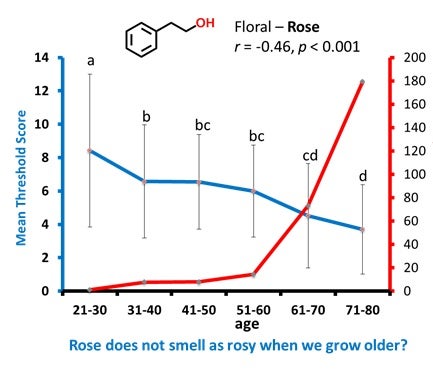Sense of rose scent changes as we age
HUANG Dejian (Group Leader, Chemistry) () October 03, 20163 Oct 2016. NUS food scientists discovered that human smell sensitivity changes with age, depending on the type of smells.
Loss in smell function with age has been well-studied. As a consequence, the elderly perceive smells at lower intensities and are less adept at discriminating between smells,which can affect food palatability and impact the quality of life. A team led by Profs HUANG Dejian and Peter ONG, together with their former Ph.D. student, Dr SEOW Yi Xin, from the Food Science and Technology programme at the Department of Chemistry, NUS set out to find solutions that help the elderly to continue enjoying healthy and nutritious food. Dr Seow has designed a testing kit for the sense of smell and conducted the test on more than 250 Singaporeans of all adult age groups for her Ph.D. project.
The investigators discovered that the population had non-uniform decrease in sensitivity towards different odours. A likely outcome of such heterogeneous loss in sensitivity is that the elderly tend to find the flavour of foods distorted and/or diminished. This causes them to derive lower gratification from food, leading to less variety in their diet or a loss in appetite. A decreased intake of the necessary nutrients might contribute to malnutrition. The opposite scenario can also occur. The elderly might resort to consuming tastier food that is usually sweet and fatty, which can lead to diseases such as obesity or hypertension.
Results revealed that sensitivity to savoury odours seemed to be relatively unaffected by age. However, the older respondents were less sensitive to fruity, floral and spicy scents.
The novelty of Dr Seow’s work lies in the single-chemical odorants used for her smell tests rather than complex mixtures. This approach reduces suppression, enhancement and adaptation interactions, thus reducing distortion in the results.
The findings can offer food product manufacturers important information to develop and supply food items that will fulfil the dietary needs of the ageing population without giving up on the perceived appeal of the food items.

Figure shows that a rose does not smell as rosy when people grow older. [Image credit: Seow YX]
Reference
YX Seow, P Ong, D Huang. “Odor-Specific Loss of Smell Sensitivity with Age as Revealed by the Specific Sensitivity Test.” Chemical Senses Vol 00 (2016) 1. doi:10.1093/chemse/bjw051.


